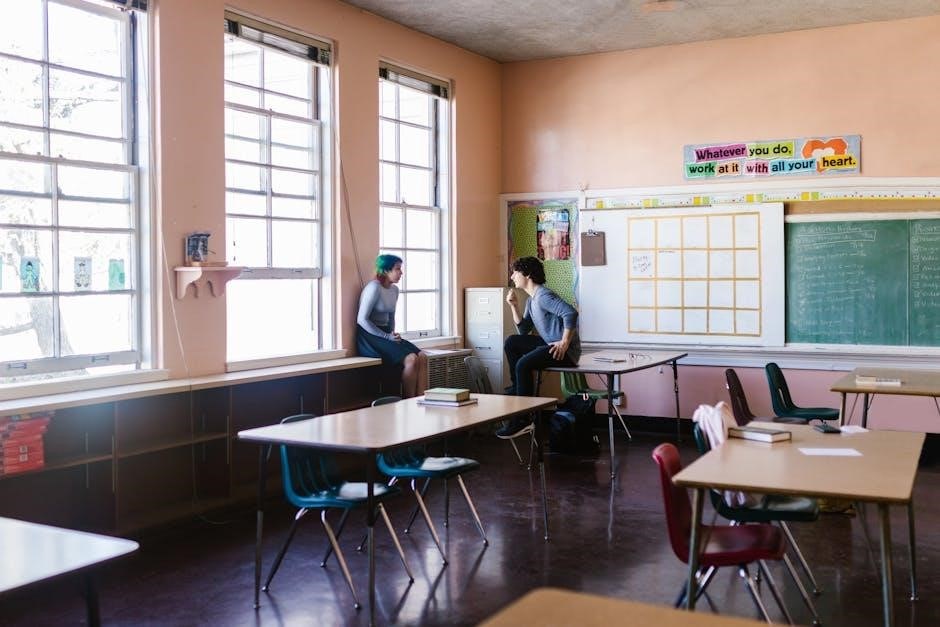Bandura’s Social Learning Theory explains how individuals acquire behaviors, attitudes, and knowledge by observing and imitating others in a social context, emphasizing cognitive processes and environmental influences.
1.1 Definition and Overview
Social Learning Theory, developed by Albert Bandura, posits that learning occurs through observation, imitation, and modeling of others’ behaviors in a social context. It emphasizes the cognitive processes involved in acquiring knowledge and behaviors, suggesting that learning can occur without immediate behavioral change. The theory bridges behaviorist and cognitive approaches, highlighting the role of environment and cognition in shaping behavior. Bandura’s framework provides a comprehensive understanding of how individuals acquire and maintain behaviors through social interactions and observational experiences.

1.2 Significance of Social Learning Theory in Psychology
Social Learning Theory significantly bridges behaviorist and cognitive approaches, emphasizing the role of observation, imitation, and cognition in shaping behavior. It highlights the influence of social environments and reciprocal interactions between individuals and their surroundings. This theory has profoundly impacted fields like education, psychotherapy, and organizational behavior, offering practical applications for understanding and modifying behaviors. Bandura’s work remains foundational in psychology, demonstrating how cognitive processes and social contexts collectively shape human behavior and learning experiences.
Historical Background and Development

Developed by Albert Bandura in the 1970s, Social Learning Theory evolved from traditional behavioral theories, emphasizing cognition and social interactions as key to learning and behavior development.
2.1 Albert Bandura and His Contributions

Albert Bandura, a renowned psychologist, introduced Social Learning Theory in the 1970s, revolutionizing understanding of human behavior. His groundbreaking work emphasized observation, imitation, and modeling as primary mechanisms of learning. Bandura’s famous Bobo doll experiments demonstrated how individuals, especially children, acquire behaviors by observing others. He later expanded his theory into Social Cognitive Theory, incorporating self-efficacy and cognitive processes. Bandura’s contributions have profoundly influenced psychology, education, and behavioral science, making him one of the most cited psychologists in history.
2.2 Evolution from Social Learning Theory to Social Cognitive Theory
Bandura’s Social Learning Theory evolved into Social Cognitive Theory in the 1980s, incorporating cognitive processes and self-efficacy. This expansion emphasized how individuals actively process information from observations, shaping their behaviors and beliefs. The theory now highlights the interplay between personal factors, behavior, and the environment, providing a comprehensive framework for understanding human behavior. This evolution underscored the dynamic and reciprocal nature of learning, making it a cornerstone of modern psychological research and application.

Core Concepts of Bandura’s Social Learning Theory
Bandura’s Social Learning Theory focuses on observational learning, imitation, and modeling. It emphasizes cognitive processes like attention and memory, shaping behavior through social interactions.
3.1 Observational Learning and Modeling
Observational learning is a fundamental concept where individuals acquire behaviors by observing and imitating others. Modeling, or demonstrating behaviors, plays a crucial role in this process. Bandura’s theory suggests that learning can occur through observation alone, even without direct reinforcement. This challenges traditional behaviorist views, emphasizing the cognitive aspects of learning. Observational learning highlights the importance of social contexts and the role of models in shaping behavior. It underscores how cognitive processes interact with environmental factors to influence learning outcomes.
3.2 Imitation and Its Role in Learning
Imitation is a key mechanism in Bandura’s Social Learning Theory, where individuals replicate observed behaviors, facilitating learning. It is driven by observation, attention, and retention of modeled actions. Imitation is most effective when models are perceived as competent or rewarded, reinforcing the behavior. This process highlights the interplay between cognitive functions, such as memory, and environmental factors. Bandura’s famous Bobo doll experiment exemplifies how observation and imitation lead to behavioral acquisition, emphasizing the social context of learning and its enduring impact on behavior development.
3.3 Vicarious Learning and Reinforcement
Vicarious learning occurs when individuals acquire knowledge or behaviors by observing others’ experiences, even without direct participation. Reinforcement, such as rewards or punishments, influences whether observed behaviors are adopted or avoided. Bandura’s theory highlights that learning can occur through observing others’ outcomes, emphasizing the role of cognitive processes in interpreting these experiences. This concept extends beyond direct reinforcement, illustrating how social environments shape behavior through indirect learning mechanisms, a cornerstone of Bandura’s social cognitive framework.

Cognitive Processes in Social Learning

Cognitive processes, including attention, memory, and self-efficacy, play a crucial role in Bandura’s theory, enabling individuals to interpret and apply observed behaviors effectively in social contexts.

4.1 The Role of Attention in Learning
In Bandura’s Social Learning Theory, attention is crucial as it determines what individuals focus on and observe. People selectively pay attention to specific behaviors or models, often influenced by factors like distinctiveness, relevance, and emotional connection. This selective attention filters the information they process, making it a foundational cognitive process in learning. Without attention, observation and subsequent imitation or learning cannot occur effectively in social contexts.
4.2 Memory and Its Impact on Behavior
Memory plays a pivotal role in Bandura’s Social Learning Theory, as it enables individuals to retain and retrieve observed behaviors. After observing a model, learners store the information in their memory, which later influences their actions. Memory ensures that learning persists over time, allowing individuals to reproduce behaviors in appropriate contexts. The clarity and relevance of stored information determine its impact, shaping future behavior based on past observations and experiences in social environments.
4.3 Self-Efficacy and Motivation
Self-efficacy, introduced by Bandura, refers to an individual’s belief in their ability to execute behaviors and achieve specific outcomes. It serves as a powerful motivator, influencing how people approach challenges and persist in the face of obstacles. High self-efficacy fosters resilience, while low self-efficacy can diminish effort and aspiration. This cognitive mechanism is central to Bandura’s theory, as it highlights the role of personal beliefs in shaping behavior and determining the level of motivation to act in social and environmental contexts effectively.

The Role of Environment in Social Learning
The environment significantly influences behavior and learning, as individuals interact with their surroundings, shaping their actions and cognitive processes through observation and reinforcement.
5.1 Reciprocal Determinism
Bandura’s concept of reciprocal determinism highlights the dynamic interaction between a person’s behavior, personal factors, and the environment. This bidirectional relationship suggests that behavior influences and is influenced by both internal cognitive processes and external environmental factors, creating a continuous cycle of cause and effect. This principle underscores the complexity of learning and behavior, emphasizing that individuals are neither passive recipients of environmental stimuli nor solely driven by internal motivations. Instead, they actively shape their surroundings while being shaped by them, illustrating a holistic view of human behavior and learning processes. This theory challenges the unidirectional causality posited by earlier behavioral theories, offering a more comprehensive understanding of how individuals learn and adapt within their social contexts. By recognizing the mutual influence of person, environment, and behavior, reciprocal determinism provides a framework for understanding the multifaceted nature of social learning, where each element continually affects the others in a reciprocal manner. This concept is central to Bandura’s Social Learning Theory, as it explains how individuals actively engage with their environment, leading to a more nuanced understanding of behavioral development and change over time. The interplay between these factors is essential for grasping the mechanisms through which learning occurs, as individuals not only observe and imitate others but also contribute to the environment that, in turn, influences their own behavior. This dynamic interaction is a cornerstone of Bandura’s theoretical framework, offering insights into the processes that govern human behavior and learning in various contexts, from education to organizational settings. Ultimately, reciprocal determinism emphasizes the importance of considering the broader social and environmental factors that play a role in shaping individual behavior, providing a more inclusive and accurate explanation of how learning takes place. This approach has been instrumental in advancing the field of psychology, particularly in understanding the complexities of human behavior and the various factors that contribute to it. By acknowledging the reciprocal relationship between person, environment, and behavior, Bandura’s theory provides a robust foundation for developing interventions and strategies aimed at fostering positive behavioral change and enhancing learning outcomes. This concept remains a pivotal aspect of Social Learning Theory, continue to influence research and applications in psychology, education, and beyond.
5.2 Interaction Between Person, Environment, and Behavior
Bandura’s Social Learning Theory emphasizes the triadic reciprocal interaction between person, environment, and behavior. Personal factors, such as cognitive processes and self-efficacy, influence how individuals perceive and respond to their environment. Environmental factors, including social contexts and reinforcement, shape behavior. Behavior, in turn, affects the environment and the individual, creating a continuous cycle of mutual influence. This interaction highlights the dynamic and reciprocal nature of learning, where individuals actively engage with and adapt to their surroundings, while also being shaped by them. Understanding this interplay is crucial for grasping how behaviors are acquired, maintained, and modified within social contexts. The theory underscores the importance of considering the broader environmental and personal factors that contribute to learning and behavior, offering a comprehensive framework for analyzing human development and change. By recognizing the mutual influence of person, environment, and behavior, Social Learning Theory provides valuable insights into the complex processes underlying behavioral acquisition and adaptation. This approach has proven particularly useful in educational and therapeutic settings, where understanding these interactions can inform strategies for fostering positive behavioral outcomes. The interplay between these elements remains a cornerstone of Bandura’s theory, illustrating the dynamic and reciprocal nature of human learning and behavior in various contexts. This perspective continues to influence research and practical applications in psychology, education, and organizational behavior, offering a robust foundation for understanding and addressing complex behavioral phenomena. The theory’s emphasis on the interaction between person, environment, and behavior underscores the importance of considering the whole system when developing interventions or educational programs aimed at promoting learning and behavioral change. By acknowledging the mutual influence of these factors, Bandura’s Social Learning Theory provides a holistic approach to understanding human behavior and learning, making it a valuable tool for scholars and practitioners alike. The theory’s focus on the interplay between individual, environmental, and behavioral factors has been instrumental in advancing our understanding of how people learn and adapt within their social environments, offering a nuanced and multifaceted perspective on human development. This approach has been particularly influential in the development of interventions aimed at promoting positive behavioral change, as it recognizes the importance of addressing the broader environmental and personal factors that contribute to behavior. By understanding the dynamic interaction between person, environment, and behavior, researchers and practitioners can design more effective strategies for fostering learning and behavioral development, ultimately leading to improved outcomes in a variety of settings. The theory’s emphasis on the reciprocal nature of these interactions highlights the importance of considering the entire system when attempting to influence behavior, whether in educational, therapeutic, or organizational contexts. This comprehensive approach has made Bandura’s Social Learning Theory a cornerstone of modern psychological thought, offering valuable insights into the complex processes underlying human behavior and learning. The theory’s focus on the interaction between person, environment, and behavior continues to inspire research and practical applications, providing a robust framework for understanding and addressing the multifaceted nature of human development. By recognizing the mutual influence of these elements, Bandura’s theory offers a powerful tool for promoting positive change and enhancing learning outcomes in diverse contexts. The interplay between person, environment, and behavior remains a central theme in Bandura’s work, underscoring the importance of considering the broader social and environmental factors that shape human behavior. This approach has proven particularly valuable in understanding how individuals learn and adapt within their social environments, offering a nuanced and comprehensive perspective on human development. By acknowledging the dynamic interaction between these factors, researchers and practitioners can develop more effective strategies for fostering positive behavioral change and enhancing learning outcomes. The theory’s emphasis on the mutual influence of person, environment, and behavior highlights the importance of addressing the entire system when designing interventions or educational programs. This holistic approach has made Bandura’s Social Learning Theory a foundational framework for understanding and addressing complex behavioral phenomena, offering valuable insights into the processes underlying human learning and development. The theory’s focus on the interplay between individual, environmental, and behavioral factors continues to influence research and practical applications in psychology, education, and beyond, providing a robust foundation for promoting positive change and improving outcomes in various contexts. By understanding the dynamic interaction between person, environment, and behavior, scholars and practitioners can develop more effective strategies for fostering learning and behavioral development, ultimately leading to improved results in a wide range of settings. The theory’s comprehensive approach has made it a cornerstone of modern psychological thought, offering a valuable framework for analyzing and addressing the complex processes underlying human behavior and learning. The interplay between person, environment, and behavior remains a central theme in Bandura’s work, emphasizing the importance of considering the broader social and environmental factors that contribute to human development. By recognizing the mutual influence of these elements, researchers and practitioners can design more effective interventions and educational programs aimed at promoting positive behavioral change and enhancing learning outcomes. This approach has proven particularly influential in the development of strategies for fostering positive behavior in various contexts, from education to organizational settings. The theory’s emphasis on the dynamic interaction between person, environment, and behavior underscores the importance of addressing the entire system when attempting to influence behavior, offering a nuanced and multifaceted perspective on human development. By understanding this interplay, scholars and practitioners can develop more comprehensive and effective strategies for promoting learning and behavioral change, leading to improved outcomes in diverse settings. The theory’s focus on the reciprocal nature of these interactions highlights the importance of considering the broader environmental and personal factors that shape human behavior, providing a robust foundation for advancing our understanding of human learning and development. This holistic approach has made Bandura’s Social Learning Theory a valuable tool for researchers and practitioners, offering insights into the complex processes underlying behavioral acquisition and adaptation. By acknowledging the mutual influence of person, environment, and behavior, the theory provides a comprehensive framework for designing interventions and educational programs aimed at fostering positive change and enhancing learning outcomes. The interplay between these elements remains a cornerstone of Bandura’s theoretical framework, emphasizing the importance of considering the entire system when attempting to understand or influence human behavior. This approach has proven particularly useful in understanding how individuals learn and adapt within their social environments, offering a nuanced perspective on human development. By recognizing the dynamic interaction between person, environment, and behavior, researchers and practitioners can develop more effective strategies for promoting positive behavioral change and improving learning outcomes in various contexts. The theory’s emphasis on the reciprocal nature of these interactions underscores the importance of addressing the broader environmental and personal factors that contribute to behavior, providing a robust foundation for advancing our understanding of human learning and development. This comprehensive approach has made Bandura’s Social Learning Theory a foundational framework for understanding and addressing complex behavioral phenomena, offering valuable insights into the processes underlying human behavior and learning. The theory’s focus on the interplay between individual, environmental, and behavioral factors continues to inspire research and practical applications, providing a valuable tool for promoting positive change and enhancing outcomes in diverse settings. By understanding the dynamic interaction between person, environment, and behavior, scholars and practitioners can design more effective interventions and educational programs aimed at fostering positive behavioral change and improving learning outcomes. The theory’s holistic approach has made it a cornerstone of modern psychological thought, offering a nuanced and multifaceted perspective on human development. The interplay between person, environment, and behavior remains a central theme in Bandura’s work, emphasizing the importance of considering the broader social and environmental factors that shape human behavior. By acknowledging the mutual influence of these elements, researchers and practitioners can develop more comprehensive and effective strategies for promoting learning and behavioral development, ultimately leading to improved results in a wide range of contexts. The theory’s emphasis on the reciprocal nature of these interactions highlights the importance of addressing the entire system when attempting to influence behavior, offering a robust framework for understanding and addressing complex behavioral phenomena. By understanding this interplay, scholars and practitioners can design more effective strategies for fostering positive change and enhancing learning outcomes, ultimately contributing to a deeper understanding of human behavior and development.
and Future Directions
Applications of Social Learning Theory

Social Learning Theory is applied in education, therapy, and leadership, providing strategies to shape behavior, enhance learning, and promote positive change through observation and modeling techniques.

